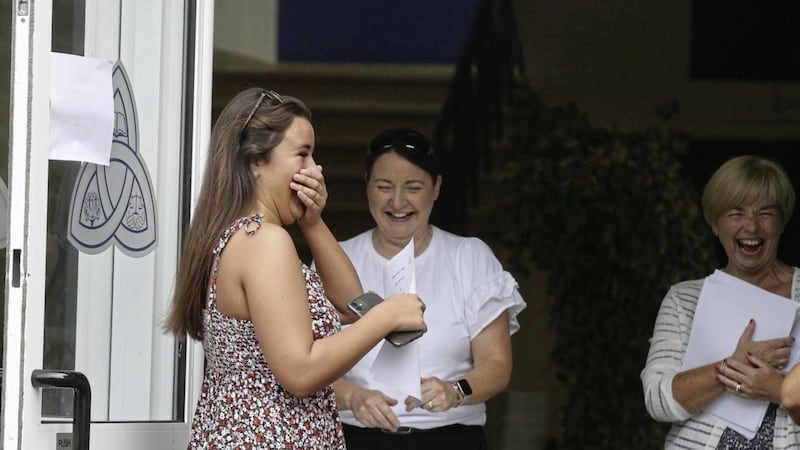SIXTH formers achieved another record breaking A-level year - although four in every 10 grades differed from teacher predictions.
With exams cancelled due to Covid-19, young people received results based on grades supplied by schools.
Exam boards also moderated results to ensure they were not significantly higher than before.
The proportion of A*-A grades increased to a record 33.2 per cent. The overall A*-E pass rate also rose to 99.1 per cent.
However, some pupils and schools complained about being `downgraded' - some by more than 60 per cent.
In calculating results, CCEA considered how well each pupil performed in their AS-levels last year, combined with resit data and teacher predictions.
The board admitted that there would be "anomalies".
CCEA is the only exam board that receives teacher assessed predictions every year, although this is the first time they have been used to formulate final grades.
In 2019, there was a 45.8 per cent match between predicted and actual grades, compared to 58 per cent this year.
Without standardisation, the proportion achieving A*-A this year would have jumped to more than 40 per cent.
Data from CCEA showed that grammar schools were most likely to over-estimate at the A grade, while for non-grammar schools it was at grade B.
Almost two-thirds (62.6 per cent) of all non-grammar A-levels were predicted a B or higher. The final figure was 45.3 per cent.
Martine Mulhern from St Cecilia's College in Derry said she was disappointed after 13 per cent of grades at A-level were lower than the pupils' AS grades.
"How is this fair and comparable now with other parts of UK?" she asked.
St Colm's High School in Draperstown also said it fared worse than expected. As recently as 2016, it had an A*-C pass rate of 95 per cent. Yesterday, this fell to 60 per cent.
"This is the lowest overall percentage ever awarded in the history of A-levels in St Colm's," said Patsy McShane, chair of the board of governors.
"Furthermore, CCEA have downgraded 90 per cent of our candidates by at least one grade. 90 per cent of the predicted grades in a top performing school have been downgraded - does this seem fair?
"Why did our staff spend so long on centre assessed grades for this robust data to be totally ignored? How can this possibly be explained to individual candidates, staff or governors?"
St Dominic's in west Belfast, meanwhile, was celebrating an A*-C pass rate of 100 per cent.
"The pupils' great achievements at GCSE and AS-level and all the hard work throughout their A-level year has paid off," said principal Carol McCann.
Education minister Peter Weir reminded schools that there was the opportunity to appeal grades.
"It was important that this year's awards were comparable to those awarded in past years and recognised as equally valid to avoid any long-term detrimental impact on the future prospects of this cohort of young people," Mr Weir said.
"Full credit must go to teachers and school leaders who very quickly produced the professional judgements required and submitted these to CCEA within the very tight deadlines set. However, for those not happy with the outcome I would emphasise that the results today are provisional, and there is an appeals process available."
Mr Weir may yet come under pressure to allow unstandardised grades to stand if young people seeking places at universities in Britain are disadvantaged.
In Wales, A-level grades will be no lower than those the pupils achieved at AS-level the previous year, while in Scotland, teacher assessments will be honoured.
Professor Tony Gallagher from Queen's University Belfast noted the late changes made in Britain.
"In England, Scotland and now Wales it seems that the balance of judgement will now work to the advantage of students, even if this means the overall increase in grades from last year will be a little higher than normal. This is essentially a political decision," he said.








